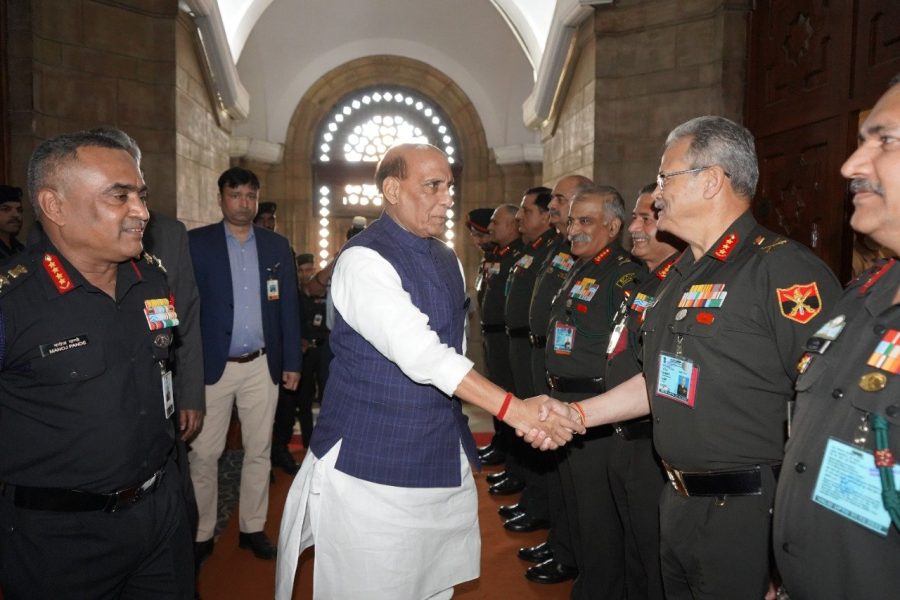
Who is responsible for India's defence? The nation ought to know
Is it the Defence Minister, the Defence Secretary, the Chief of Defence Staff or the National Security Advisor?

The average Indian is blissfully unaware of and cavalierly incurious about where the responsibility of the nation’s defence rests.
Historically, the defence secretary, a generalist civil servant and not a defence professional, had been designated as the functionary responsible. It is another matter that no defence secretary was ever held culpable for military blunders that accrued under his watch. These include the 1962 ‘Himalayan blunder’ which cost India huge loss of face and its defence forces hundreds of lives. To wit, the ‘responsibility’ of the nation’s defence was not predicated to any ‘accountability’.
When the much advertised defence reforms were introduced in 2020, it was the fond hope of the military and analysts that this incongruity would be remedied. These hopes were wrecked just before the creation of the Department of Military Affairs on January 1, 2020 as the fifth department of the Ministry of Defence (MoD) with General Bipin Rawat, the first Chief of Defence Staff (CDS), as its secretary.
Exclusive | Sino-India war 1962: What exactly caused Delhi’s intelligence failure
Two days before that, the Government of India (GoI) Allocation of Business Rules, 1961 assigned the subject of “Defence of India and every part thereof including defence policy and preparation for defence and all such acts as may be conducive in times of war to its prosecution and after its termination to effective demobilisation” to the Department of Defence (DoD).
A penumbraic area
Notably, the responsibility was not passed on to the defence secretary but to the DoD. It could be argued that, as the head of the department, the defence secretary automatically becomes responsible for the defence of India. However, that is a penumbraic area.
Rule 11 of the GoI Transaction of Business Rules, 1961 says that departmental secretaries are “the administrative heads of their departments responsible for the proper transaction of business and the careful observance of these rules in the department”. Further, the rules state that all business allocated to the department shall be disposed of under the directions of the minister in charge of the department.
Is the defence minister responsible for the nation’s defence then? That question is rhetorical.
So, while we have a CDS in place, he is not responsible for the nation’s defence. Indeed, he is subservient to the defence secretary who, as explained above, also does not bear the responsibility of the nation’s defence.
Opinion: It’s time State Public Service Commissions cleaned up their act
As an aside, the secretary of defence (equivalent of India’s defence minister) is the head of the US DoD, the executive department of the US defence forces. The US secretary of defence exercises command and authority over the military second only to the president, who is the commander-in-chief. The current and the two secretaries of defence before him are military men and only one of the four past secretaries of defence has been a non-military person. By law, he is a member of the National Security Council.
Defence preparedness
Coming back to India, in April 2018, the MoD formed the Defence Planning Committee (DPC) and the National Security Advisor (NSA) was appointed as its chairperson. The present NSA, who has held that position since 2014, is an Indian Police Service officer with no defence background. The NSA’s DPC mandate included preparing drafts on national security strategy, strategic defence review and doctrines, improving defence manufacturing ecosystem, and a concomitant defence plan among others.
A coherent, well contemplated national security strategy and a defence plan would have served to crystallise thoughts on the nation’s defence. But as none of these documents has been prepared even after five years, doubts about the nation’s defence preparedness are justified.
Opinion: Nepal’s chronic instability a huge worry for India; is Delhi doing enough?
Possibly, if a national security policy had been articulated and reduced to writing, it may have answered two questions. First, what is needed for the defence of the nation in terms of military wherewithal? Second, what is the final resting place of the proverbial buck should the nation’s defence preparedness be brought to an ignominious outcome in a kinetic duel with one or both of our inimical neighbours?
If these two questions are addressed, maybe the needs (not wants) of the military could receive higher priority. For one, the fighter squadron strength of the Indian Air Force (IAF), which is now three-fourths of the sanctioned strength of 42, may get the attention it deserves.
So, is it the minister of defence who is responsible and accountable for the nation’s defence? Or the defence secretary? Or the national security advisor? Or the CDS?
Will the person responsible for the defence of India please stand up?
(The writer is an alumnus of the National Defence Academy and the Air Force Academy, and served as a Commodore Commandant. He has 44 years of experience working with the IAF and as COO of an airline.)
(The Federal seeks to present views and opinions from all sides of the spectrum. The information, ideas or opinions in the articles are of the author and do not necessarily reflect the views of The Federal)


